 Fr Sean McDonagh speaking of Laudato Si' at seminars around the world. Flickr Photo: ©Anthony Jalandoni/www.flickr.com/photos/jalandoni/25377370405
Fr Sean McDonagh speaking of Laudato Si' at seminars around the world. Flickr Photo: ©Anthony Jalandoni/www.flickr.com/photos/jalandoni/25377370405
On July 5 and 6, 2018, the Vatican Dicastery for Promoting Integral Human Development organised a conference to reflect on what has happened to the environment during the last three years and how to plan for the future. During the two days, many of the speakers, including Professor Nicholas Stern of the London School of Economics, reminded the audience of the urgency of dealing with climate change. If we do not adopt carbon-neutral lifestyles and seriously invest in non-carbon energy technologies, we will not be able to keep the global average increase in temperature below the two degrees Celsius which was agreed at COP 21 in Paris in 2015. Unless we change our lifestyles, we will be passing on to the next generation a world which will be much more difficult to live in.
The conference followed the See-Judge-Act methodology which is central to Catholic social teaching. It attempted to look at the challenges in the area of justice and the environment in a holistic way, so that we could hear “both the cry of the earth and the cry of the poor” (LS, 49). Some of the speakers focused on the crisis in food production, especially for the poor. Others called attention to the plight of migrants and refugees and the lack of understanding and empathy among those living in rich countries. The anti-migration stance of populist politicians in Europe and the United States is not helpful, given the magnitude of what we are facing.
Indigenous groups from Latin America and Greenland also reminded us of what neo-liberal economic policies and climate change are doing to their homelands. As someone who spent over a decade working with the T’boli people on the island of Mindanao in the Philippines, I realised how much indigenous people have to teach those of us who live in Northern countries. Indigenous communities are much more sensitive to what is happening in the natural world than many well-educated people in Europe.
 Photo: MalkovKosta/Bigstock.com
Photo: MalkovKosta/Bigstock.com
On July 1, 2018 just before I travelled to Rome to attend the conference in the Vatican, we Columbans celebrated the one hundredth anniversary of our founding in 1918. I had asked the people who tend our grounds here in Dalgan, Navan, not to mow a small section of the lawns so that we could see and experience the beauty of our wild flowers. Since March 2018, we had named about thirty species of wildflowers, including an orchid on that particular patch. However, on June 30, 2018, the lawnmowers moved in and cut that area of the lawn so that the whole place would look neat and tidy! The tragedy is that in Ireland and Britain we are on course to cause the extinction of 30 percent of our pollinators because their food sources are being destroyed.
This will also affect our food production.
One of my criticisms of the two-day conference on Laudato Si’ in the Vatican is that the importance of biodiversity was not adequately treated.
Columban Fr Sean McDonagh was a missionary in the Philippines for many years, he has worked tirelessly in the area to improve the care of the earth and has published numerous books. He was an advisor to Pope Francis on preparing his encyclical, Laudato Si’.
Listen to Laudato Si' turns three
Related links
- Read more from The Far East, September 2018

